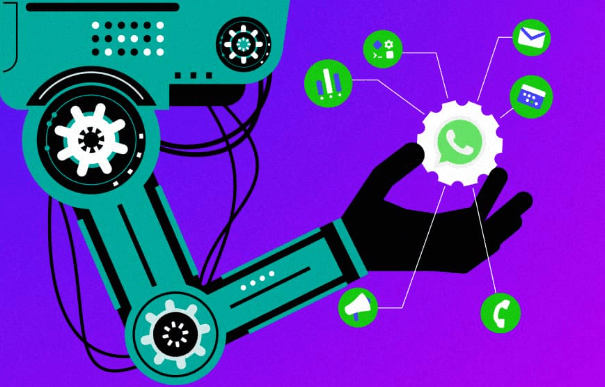WhatsApp AI-Powered Customer Support: Transforming Business Interaction

In 2024, WhatsApp has solidified itself as not just a messaging app, but also as a powerful tool for business communication and customer support. The integration of AI-powered tools within WhatsApp’s platform is revolutionizing how businesses interact with their customers, providing instant and efficient support, and enhancing overall user satisfaction. By leveraging artificial intelligence (AI), businesses can automate customer inquiries, resolve issues more quickly, and personalize interactions, all within the familiar WhatsApp interface.
This transformation highlights WhatsApp’s evolving role in business communication, particularly as customer expectations for quick, accurate, and personalized service continue to rise. Let’s dive into the ways WhatsApp is utilizing AI to redefine customer support, along with the benefits and challenges it brings.
How AI-Powered Customer Support on WhatsApp Works
At its core, AI-powered customer support on WhatsApp involves the use of chatbots and automation tools to handle customer inquiries and provide real-time responses. These systems can perform various functions, including answering frequently asked questions (FAQs), assisting with orders, managing bookings, and even troubleshooting technical issues—all without the need for human intervention.
AI-driven chatbots on WhatsApp can be programmed to:
- Respond instantly to common customer queries using pre-defined responses.
- Escalate issues to human agents when necessary, ensuring that more complex queries are addressed appropriately.
- Offer personalized support by analyzing user data and preferences, which can help in tailoring responses or offering product recommendations.
- Facilitate 24/7 customer support, allowing businesses to maintain a continuous service flow even outside regular working hours.
For instance, e-commerce businesses use AI chatbots to assist customers with order tracking, payment issues, or product details, while service-based industries like healthcare and travel leverage these systems to handle booking and scheduling requests.
See also: Twitter as a Monetization Platform for Creators: Evolving Beyond Traditional Ad Revenue
Key Benefits of AI-Powered Customer Support on WhatsApp
1. Instant Response and Customer Satisfaction
One of the most significant advantages of AI-powered customer support is the ability to provide instant responses. Customers today expect quick resolutions, and AI chatbots allow businesses to respond immediately to common queries. This instant engagement not only improves customer satisfaction but also enhances brand loyalty, as customers feel that their concerns are being addressed promptly.
With WhatsApp being one of the most widely used messaging platforms, businesses can capitalize on its reach and familiarity to offer seamless support, without requiring customers to switch to a different app or website.
2. Cost-Efficiency and Scalability
AI-powered chatbots are cost-effective because they reduce the need for human agents to handle routine inquiries. This allows businesses to scale their customer support operations without having to hire and train large teams of support staff. For small and medium-sized enterprises (SMEs), this can be especially valuable, as it offers an affordable way to maintain high levels of customer service.
By automating repetitive tasks, businesses can redirect human resources toward more complex problem-solving, creating a more efficient support structure. This helps manage high volumes of customer requests without overwhelming support teams, making businesses more scalable as they grow.
3. Personalized Customer Interaction
AI can do more than just provide automated responses—it can also offer personalized interactions. By analyzing past customer interactions, purchasing behavior, and preferences, AI chatbots can deliver tailored recommendations, whether it’s for products, services, or solutions. This level of personalization helps businesses build stronger relationships with their customers, leading to improved sales and higher retention rates.
For example, a customer looking to buy shoes may interact with a WhatsApp AI chatbot that not only answers their queries about size availability but also recommends related items like socks or accessories based on previous purchases. This enhances the shopping experience and encourages cross-selling and upselling opportunities.
4. Improved Data Analytics
Another powerful benefit of using AI on WhatsApp for customer support is the data analytics capabilities. AI systems collect and analyze customer data in real-time, offering insights into customer behavior, preferences, and common pain points. Businesses can use these insights to improve their products, refine their marketing strategies, and anticipate customer needs more accurately.
For example, by analyzing common queries that the chatbot handles, a business might identify a recurring issue with a particular product or service. They can then address the issue proactively, whether through product updates, improved documentation, or additional customer support resources.
Challenges and Considerations
While AI-powered customer support on WhatsApp offers many benefits, it also presents several challenges that businesses need to navigate.
1. Limited Understanding of Complex Queries
Although AI chatbots are highly effective at handling straightforward inquiries, they may struggle with complex or nuanced questions that require deeper understanding. In these cases, AI systems might provide incorrect or irrelevant answers, leading to customer frustration. This highlights the importance of offering a smooth handover to human agents when necessary.
To address this, businesses must ensure that their AI chatbots can recognize when a query exceeds their capabilities and escalate it to a human representative, preserving the customer experience.
2. Data Privacy Concerns
Given the increasing focus on data privacy, businesses must ensure that their AI-powered WhatsApp support systems adhere to stringent privacy standards. WhatsApp has end-to-end encryption, which offers a high level of security for users. However, businesses must still comply with data protection regulations like GDPR or CCPA, ensuring that customer data collected via WhatsApp is stored and processed securely.
Additionally, businesses should maintain transparency about how customer data is used, building trust with users who are increasingly concerned about privacy.
3. Maintaining a Human Touch
While automation can streamline operations, some customers still prefer interacting with human representatives, especially for sensitive or emotionally charged issues. Businesses must strike a balance between automation and personal interaction to avoid making their customer support feel impersonal or robotic. Providing clear options for speaking with a human agent can help maintain the human touch that many customers value.
The Future of WhatsApp AI-Powered Support
The future of AI-powered customer support on WhatsApp looks promising as the platform continues to expand its capabilities. Emerging technologies like natural language processing (NLP) and machine learning are making AI systems more intuitive, allowing them to handle more complex queries and provide even deeper personalization.
In the coming years, businesses may begin integrating voice-activated chatbots, allowing customers to interact with AI systems using voice commands instead of typing. WhatsApp could also introduce more sophisticated features for AI-driven customer relationship management (CRM), helping businesses track and manage customer interactions across multiple channels seamlessly.
Conclusion
AI-powered customer support on WhatsApp is a game-changer for businesses looking to provide fast, efficient, and personalized customer service. With its ability to handle high volumes of inquiries, offer instant responses, and enhance customer interactions, AI technology is transforming the way companies engage with their audiences. While challenges like data privacy and the need for human touch remain, the benefits of integrating AI into WhatsApp’s ecosystem are undeniable.
As AI technology continues to evolve, the role of WhatsApp in business communication is set to grow, offering more advanced tools and capabilities to enhance customer experiences in a fast-paced digital world.



